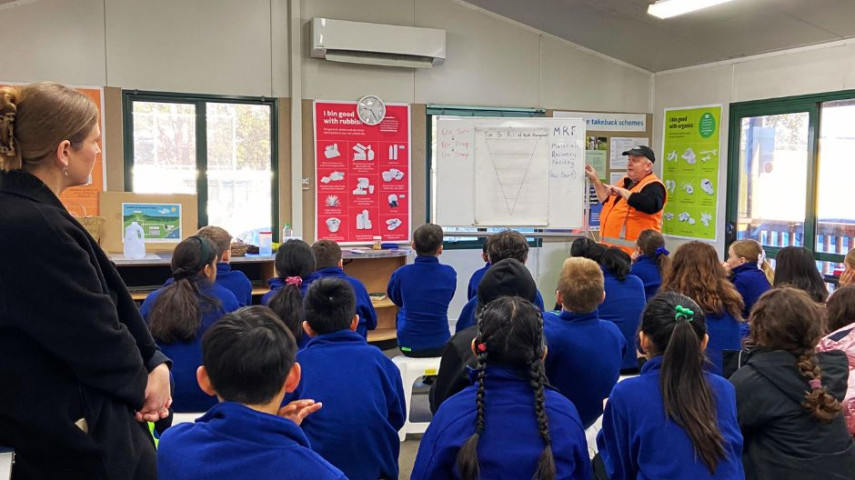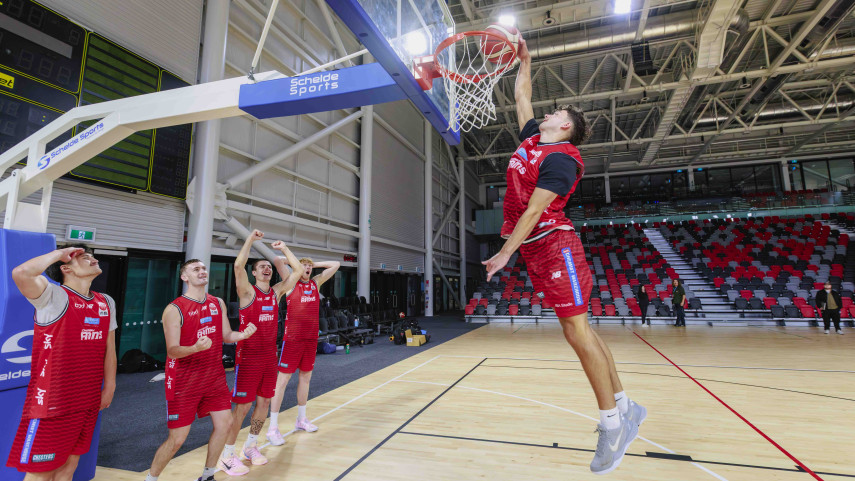Ever wondered what happens to your recycling after it is collected? Where does it go and what is it recycled into? On this programme, students learn about the reduce, reuse and recycle aspects of the waste management hierarchy.

Free bus offer available.
Book a Learning Through Action school programme
Risk analysis and management information (RAMS) will be sent out once a programme booking is confirmed. If you require this at any other stage please email LTA@ccc.govt.nz or contact us(external link).

| Year level | 5 to 13 |
|---|---|
| Curriculum level | 2 to 8 |
| Availability | Year-round |
| Times |
9.30am to 12.15pm or midday to 2.30pm |
| Site |
EcoSort (Parkhouse Road Materials Recovery Facility—MRF), |
| Cost | Free |
| Number of students | Maximum of 35 |
| Special requirements | There are special parking requirements for this programme. Closed-in shoes must be worn. |
- Waste minimisation and management.
- Waste hierarchy.
- Recycling methods and technology.
- Sustainability.
- Personal and social responsibility for action.
Ever wondered what happens to your recycling after it is collected from the kerbside? Where does it go, how is it sorted, what is it recycled into, and how can we get it right?
On this programme students learn about the Reduce, Reuse and Recycle aspects of the waste management hierarchy at three key sites:
EcoSort
From the safety of the Education Room students will have the opportunity to see the Materials Recovery Facility in action as recycling from yellow bins from around Christchurch is dropped off to be sorted and processed. Students will participate in activities to identify key aspects of waste management and minimization and will be challenged to consider how waste products can be viewed as resources.
EcoDrop
Students will have the opportunity to see where unwanted but usable materials that cannot be recycled through the yellow wheelie bin can be dropped to keep them out of landfill.
EcoShop
This is an opportunity for students to use their imaginations and work creatively and collaboratively with the pre-loved items at the EcoShop to meet a “Flat-Out” challenge.
We are learning to:
- Organise the key waste actions into a hierarchical order of importance for waste minimisation and management.
- Evaluate the cost-benefit ratio of a variety of products based on environmental, financial and time costs to determine a best-fit product.
- Understand how yellow wheelie bin items are mechanically sorted, what items they are recycled into and the importance of best practice when putting items in the yellow bin.
- Understand the value of high-quality used goods and the importance of keeping these items out of landfill.
Using language, symbols and texts
Students will interpret images, symbols and text to understand different aspects of the recycling process.
Thinking
Students will use critical and evaluative processes to determine the best-fit product from a variety of options, based on price, environmental impact and convenience.
Managing self
Across three different learning sites, students will manage their learning and behaviour and act in an appropriate and safe manner.
Participating and contributing
Students will contribute to expanding group knowledge by understanding the recycling process and how to action this knowledge back in the classroom.
Relating to others
Students will work collaboratively and supportively to complete tasks; take turns and support their classmates.
| Curriculum area | Strand and level | Objective |
|---|---|---|
| Science Pūtaiao |
Nature of Science Levels 2 to 8 |
Investigating in science Communicating in science Participating and contributing |
| Material World Levels 2 to 8 |
Properties and changes of matter Chemistry and society |
|
| Technology Hangarau |
Technological Practice Levels 2 to 8 |
Brief development Outcome development and evaluation |
| Technological Knowledge Levels 2 to 8 |
Technological products Technological systems |
|
| Nature of Technology Levels 2 to 5 |
Characteristics of technology Characteristics of technological outcomes |
|
| Social Sciences Tikanga ā-Iwi |
Levels 2 to 8 | Social studies Economics |
| Health and Physical Education Hauora |
Healthy Communities and Environments Levels 2 to 4 |
Societal attitudes and values Community resources People and the environment |
Level 1
| Subject | Standard |
|---|---|
| Chemistry | 1.2 AS90931 |
| Economics | AS90983 AS90985 AS90986 |
| Mathematics and Statistics | 1.1 AS91026 |
| Science | 1.2 AS90941 1.7 AS90946 |
| Physics | 1.2 AS90936 1.3 AS90937 |
| Social Studies | 1.4 AS91042 1.5 AS91043 |
| Generic Technology | 1.5 AS91048 1.6 AS91049 1.7 AS91050 1.8 AS91051 1.9 AS91052 |
| Processing Technologies | 1.61 AS91083 |
Level 2
| Subject | Standard |
|---|---|
| Environmental Sustainability | AS90810 AS90811 AS90813 AS90814 AS91733 AS91734 |
| Business Studies | AS90843 |
| Social Studies | AS91282 |
| Generic Technology | 2.8 AS91361 2.9 AS91362 2.10 AS91363 |
| Processing Technologies | 2.61 AS91352 |
Level 3
| Subject | Standard |
|---|---|
| Business Studies | US25424 AS91871 |
| Business Operation and Development | US27765 US27519 |
| Environmental Sustainability | AS90828 AS90831 AS91736 |
| Social Studies | 3.1 AS91596 |
| Generic Technology | 3.8 AS91615 3.14 AS91619 |
Related news

Canterbury Rams and Mainland Pouākai to light up the show court at Parakiore
Parakiore is officially the new home of the Canterbury Rams and Mainland Pouākai basketball teams.
18 Feb 2026
Exemption granted for central city noise plan change
Work will continue on the Central City Noise plan change.
13 Feb 2026
Celebrate Valentine’s Day at Mitre10 Sparks
Mitre10 Sparks will light up the skies this weekend with a special Valentine’s Day themed concert at Hagley Park for lovers of free, open-air music.
9 Feb 2026